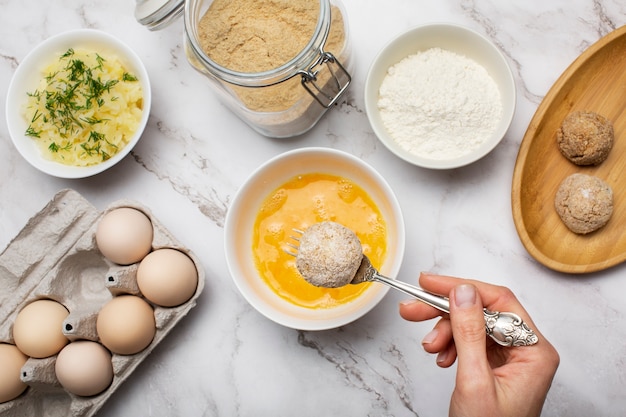Remember that adorable moment when your little one, with their tiny hand outstretched, grabbed a piece of your scrambled eggs? It was probably a bit of a shock, wasn't it? That little hand, usually reaching for toys, was now reaching for something new, something that felt... different. That's the moment you know it's time to introduce them to the world of eggs. But with so much conflicting information out there about allergies and cooking methods, it can be a bit overwhelming, right? Don't worry, mama and papa, I'm here to help! This comprehensive guide will walk you through everything you need to know about introducing eggs to your baby, from safety concerns to delicious recipes. Let's get cracking!
(Part 1) The Egg-cellent Introduction: When and How?

So, when is the right time to introduce eggs? There are no hard and fast rules, but generally, around 6 months is a good starting point. Babies at this age have developed the ability to digest more complex foods and their immune system is maturing. However, every baby is different, and it's always best to consult with your pediatrician. They can advise you based on your baby's individual development and any potential allergies or sensitivities they might have.
Starting Slow and Steady
Remember, it's all about starting slow and steady. Here's what I suggest:
- Begin with a small amount, like just a teaspoon of cooked egg. This allows you to gauge your baby's reaction and see if there are any signs of allergy. It's a good idea to start with a plain, unseasoned egg so you can easily identify any potential reactions.
- Introduce eggs one at a time, and ideally, on a day when you don't have other new foods being introduced. This helps you identify any potential food sensitivities more easily. For example, if you introduce eggs and a new fruit on the same day, it might be harder to tell which one caused a reaction, if any.
- Look out for signs of an allergic reaction. Common signs include hives, swelling of the face and lips, vomiting, and diarrhoea. If you notice any of these, stop giving your baby eggs immediately and contact your doctor. It's always better to err on the side of caution and consult with a professional.
I remember introducing eggs to my little one and being a bit nervous. It was a whole new food group! We started with just a tiny bit of scrambled eggs and watched for any reactions. Thankfully, everything went smoothly, and he loved them!
(Part 2) Egg-sploring the Benefits

Eggs are a nutritional powerhouse, and they are a great source of:
- Protein: Essential for healthy growth and development. Protein helps build and repair tissues, making it crucial for a growing baby.
- Choline: A nutrient that supports brain development and memory function. Choline is particularly important for the development of the brain and nervous system in infants and young children.
- Vitamins: Eggs are packed with vitamins like B12, A, D, E, and K, all of which play important roles in various bodily functions. Vitamin B12 is important for red blood cell formation, vitamin A for vision and immune function, vitamin D for bone health, vitamin E for antioxidant protection, and vitamin K for blood clotting.
- Minerals: Including iron, zinc, selenium, and calcium, which are all essential for healthy growth. Iron is crucial for carrying oxygen throughout the body, zinc for immune function and growth, selenium for antioxidant protection, and calcium for strong bones and teeth.
From my experience, a good source of protein and essential vitamins helps little ones with their energy levels and aids in their development. My little one was a fussy eater, and adding eggs to his diet really helped with his energy and attention span during playtime. It was amazing to see how much more engaged he became after incorporating eggs into his meals.
(Part 3) Egg-ceptional Safety Tips

We all want to make sure our little ones are eating safely, and eggs are no exception. Here are some key safety tips to keep in mind:
- Choose pasteurized eggs: These eggs have been treated to kill any harmful bacteria, reducing the risk of salmonella. You can find pasteurized eggs at most supermarkets. Look for the label "pasteurized" on the carton.
- Store eggs properly: Keep eggs in the refrigerator and make sure they are not kept at room temperature for long periods. Eggs should be stored in the coldest part of the refrigerator, ideally below 40°F (4°C).
- Cook eggs thoroughly: Eggs should be cooked until the whites are firm and the yolks are no longer runny. This ensures all harmful bacteria are eliminated. You can use a thermometer to check the internal temperature of cooked eggs. It should reach at least 160°F (71°C) to ensure safety.
- Wash your hands and utensils: Thoroughly wash your hands with soap and water before and after handling eggs, and make sure all utensils are clean. This is a good practice to prevent the spread of bacteria.
- Avoid raw or undercooked eggs: This includes foods like homemade mayonnaise, Caesar salad dressing, and mousse. These foods should only be consumed if they are made with pasteurized eggs.
I remember being a bit apprehensive about introducing eggs because of the salmonella risk. But with a bit of knowledge and these simple precautions, you can confidently serve eggs to your baby. It's always better to be safe than sorry, right?
(Part 4) Egg-cellent cooking techniques
Now that you've learned the basics of egg safety, let's dive into some cooking techniques that are perfect for babies.
Soft-boiled eggs
soft-boiled eggs are a great first introduction to eggs, especially for babies who are just starting to explore different textures. Here's how to make them:
- Gently place the egg in a pot of boiling water. Make sure the water is boiling before adding the egg.
- Boil for 3-4 minutes for a runny yolk. You can adjust the cooking time depending on your baby's preference. For a softer yolk, cook for a shorter time.
- Remove the egg from the pot and place it in a bowl of ice water to stop the cooking process. This will help prevent the yolk from overcooking.
- Peel the egg carefully and mash the yolk with a fork to make it easier for your baby to eat.
Scrambled Eggs
Scrambled eggs are a classic and versatile option that can be easily adapted to your baby's preferences. Here's what you need to do:
- Crack the egg into a bowl and whisk until the white and yolk are combined. You can add a splash of milk or water to make the scrambled eggs smoother and creamier.
- Heat a little oil in a pan over medium heat. Use a light oil like olive oil or coconut oil.
- Pour the egg mixture into the pan and cook, stirring frequently, until the eggs are set but still soft. Don't overcook the eggs, as they can become dry and rubbery.
- Serve immediately.
Omelettes
Omelettes offer a bit more flavour and texture. Here's how to make them:
- Whisk two eggs together in a bowl, adding a pinch of salt and pepper. You can omit the salt and pepper for babies under one year old.
- Heat a little oil in a pan over medium heat.
- Pour the egg mixture into the pan and cook, tilting the pan to allow the uncooked egg to flow underneath. This will create a thin, even layer of omelette.
- When the egg is mostly set, add your desired fillings, such as chopped vegetables or cheese. Choose soft, finely chopped vegetables like spinach, zucchini, or sweet potato.
- Fold the omelette in half and cook for another minute or two until the filling is heated through.
- Serve immediately.
Remember to avoid adding any salt or sugar to your baby's eggs, especially during the first few introductions. Babies don't need added salt and sugar, and it's best to let them develop their natural taste preferences.
(Part 5) Egg-traordinary Recipes
Here are some delicious recipes that are perfect for introducing your baby to the wonderful world of eggs:
Simple Scrambled Eggs with Avocado
This recipe is easy to make and packed with healthy fats and nutrients.
- Ingredients: 1 egg, 1/4 avocado, a splash of milk (optional)
- Instructions:
- Crack the egg into a bowl and whisk until the white and yolk are combined. Add a splash of milk if desired. This will make the scrambled eggs smoother and creamier.
- Heat a little oil in a pan over medium heat. Use a light oil like olive oil or coconut oil.
- Pour the egg mixture into the pan and cook, stirring frequently, until the eggs are set but still soft. Don't overcook the eggs, as they can become dry and rubbery.
- Mash the avocado and add it to the scrambled eggs. You can mash the avocado with a fork or use a food processor for a smoother texture.
- Serve immediately.
Egg and Sweet potato fritters
These fritters are a fun and tasty way to get your baby to eat their veggies.
- Ingredients: 1 egg, 1/2 sweet potato, 1 tablespoon of flour, 1 tablespoon of breadcrumbs, a splash of milk (optional)
- Instructions:
- Preheat oven to 350°F (175°C).
- Peel and mash the sweet potato. You can use a fork or a potato masher.
- In a bowl, whisk the egg, flour, breadcrumbs, and milk (optional). Add the mashed sweet potato and mix well. The milk will make the fritters more moist.
- Shape the mixture into small fritters. Use a spoon to scoop out the mixture and drop it onto a baking sheet.
- Place the fritters on a baking sheet lined with parchment paper and bake for 15-20 minutes, or until golden brown and cooked through.
- Serve immediately.
Egg and Spinach Muffins
These muffins are perfect for breakfast or snack time.
- Ingredients: 1 egg, 1/4 cup of spinach, 1/4 cup of shredded cheese, 1/4 cup of flour, 1 tablespoon of milk, 1/2 teaspoon of baking powder
- Instructions:
- Preheat oven to 350°F (175°C).
- Grease a muffin tin. Use a non-stick cooking spray or butter.
- In a bowl, whisk the egg, milk, and flour. Add the spinach, cheese, and baking powder and mix well. You can use fresh spinach or frozen spinach that has been thawed and squeezed dry.
- Divide the mixture evenly among the muffin cups.
- Bake for 15-20 minutes, or until the muffins are golden brown and cooked through. You can insert a toothpick into the center of the muffins to check if it comes out clean.
- Let the muffins cool slightly before serving. This will help them firm up.
(Part 6) Egg-xploring Different Forms
Once your baby has gotten used to the taste and texture of eggs, you can start to explore different forms.
Eggs in Soups
Eggs can be a great addition to soups, adding protein and richness. Try adding a whisked egg to a simple vegetable soup or a creamy tomato soup. You can whisk the egg in a separate bowl and then slowly pour it into the hot soup while stirring. This will create delicate egg ribbons in the soup.
Eggs in Smoothies
Eggs can also be added to smoothies for a boost of protein and nutrients. Simply blend a cooked egg with your favourite fruits and vegetables. You can hard-boil an egg, chop it up, and add it to your smoothie. Or you can blend a scrambled egg into your smoothie for a creamier texture.
Eggs in Baked Goods
As your baby gets older, you can start to incorporate eggs into baked goods. They add moisture, texture, and flavour to cakes, cookies, and muffins. Eggs help bind the ingredients together and create a light and airy texture.
Remember to always consult with your pediatrician before introducing new foods to your baby, especially if they have any allergies or sensitivities.
(Part 7) Egg-ceptional Tips for Success
Introducing eggs can be a rewarding experience, but it can also come with its fair share of challenges. Here are a few tips that can make the process a little easier:
- Be patient: It may take a few tries for your baby to get used to the taste and texture of eggs. Don't be discouraged if they don't love them at first. Keep offering eggs in different ways and let them explore the flavours and textures at their own pace.
- Be creative: Try different cooking methods and recipes to find what your baby enjoys. Don't be afraid to experiment and find new ways to incorporate eggs into your baby's diet.
- Listen to your baby: If your baby shows signs of an allergic reaction, stop giving them eggs immediately and contact your doctor. Trust your instincts and always seek professional guidance when it comes to your baby's health.
- Have fun!: Introduce eggs with a positive and playful attitude. Make mealtime a fun and enjoyable experience for both you and your baby.
Remember, every baby is different, and there's no one-size-fits-all approach. It's all about finding what works best for your little one.
(Part 8) Egg-splore Your Local Market
You might be surprised at the variety of eggs available at your local market. Beyond the standard white and brown eggs, you can find eggs from different breeds of chickens, such as:
- free-range eggs: These eggs come from chickens that have access to outdoor space. Free-range chickens have more room to roam and forage for natural foods, which can result in a richer flavour and higher nutrient content in their eggs.
- Organic eggs: These eggs come from chickens that are raised without the use of antibiotics or hormones, and they eat organic feed. Organic eggs are free from synthetic pesticides and fertilizers, making them a healthier option for your family.
- Pasture-raised eggs: These eggs come from chickens that are raised on pasture, which means they have access to a wider range of foods and nutrients. Pasture-raised chickens have a more natural diet and are often free to roam in a larger space, which can contribute to a more vibrant yolk colour and a richer taste in their eggs.
- Duck eggs: Duck eggs have a richer flavour than chicken eggs and are a good source of protein and nutrients. Duck eggs have a slightly larger yolk and a richer, creamier texture than chicken eggs.
- Quail eggs: These eggs are smaller than chicken eggs and have a more delicate flavour. Quail eggs are packed with nutrients and can be a fun and interesting addition to your baby's meals.
It's interesting to explore these different varieties of eggs and see which ones your baby enjoys. Sometimes, the added flavour or texture can make all the difference.
(Part 9) FAQs
1. How do I know if my baby is allergic to eggs?
The best way to determine if your baby is allergic to eggs is to consult with your pediatrician. They can help you identify any potential risks and recommend the best course of action. Keep a close eye on your baby for any signs of allergy after introducing eggs. If you notice any of these, stop giving your baby eggs immediately and contact your doctor.
2. What if my baby doesn't like the taste of eggs?
Don't worry! It's common for babies to be hesitant to try new foods, especially ones with a strong taste or texture. Try offering eggs in different ways, such as scrambled, soft-boiled, or incorporated into other recipes. You can also try mixing eggs with other foods that your baby already enjoys. For example, you can add a scrambled egg to your baby's oatmeal or blend a cooked egg into a fruit smoothie.
3. How many eggs can my baby eat?
There's no set limit on how many eggs your baby can eat. Start with small amounts and gradually increase the portion size as your baby gets older. Remember to always consult with your pediatrician for personalized recommendations. They can advise you on appropriate portion sizes based on your baby's age and dietary needs.
4. Can I give my baby raw eggs?
It's not safe to give your baby raw eggs, as they can contain harmful bacteria like Salmonella. Make sure all eggs are cooked thoroughly before serving to your baby. Raw eggs can cause food poisoning, which can be very dangerous for infants.
5. Can I use egg substitutes for my baby?
Egg substitutes are generally safe for babies, but it's important to check with your pediatrician to make sure they are appropriate for your baby's age and any allergies they might have. Some egg substitutes contain ingredients that may not be suitable for infants, so it's always best to consult with a healthcare professional.
Introducing eggs to your baby is a special milestone. It's a chance for them to explore new flavours and textures, and for you to see their little personalities come alive as they discover this new food. Remember, the key is to be patient, creative, and listen to your baby. Have fun and enjoy this delicious journey together!
Everyone is watching

Prime Rib Roast Cooking Time Chart: Per Pound Guide
Cooking TipsPrime rib roast. Just the name conjures images of lavish dinners, crackling fires, and hearty laughter. It’s ...

How Long to Bake Potatoes in the Oven (Perfect Every Time)
Cooking TipsBaked potatoes are a staple in my kitchen. They're incredibly versatile, delicious, and surprisingly easy to m...

Perfect Rice Every Time: The Ultimate Guide to Cooking Rice
Cooking TipsAs a self-proclaimed foodie, I've always been a bit obsessed with rice. It's the foundation of countless cuisi...

The Ultimate Guide to Cooking Asparagus: Tips, Techniques, and Recipes
Cooking TipsAsparagus. The mere mention of this spring delicacy conjures up images of vibrant green spears, crisp and burs...

Ultimate Guide to Cooking the Perfect Thanksgiving Turkey
Cooking TipsThanksgiving. Just the word conjures up images of overflowing tables laden with delicious food, the scent of r...
